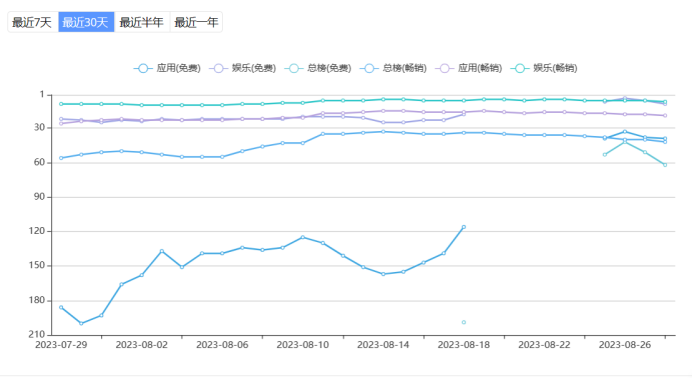{{!completeInfo?'请完善个人信息':''}}
精准高效领先的融资对接服务


Just as the trend of Chinese web literature is sweeping the world, short dramas have also embarked on a journey to the sea


"Following the foray of China's online literary community, a work titled 'Dragon Hunt' left foreign friends on the other side of the ocean unable to think about tea or food until the next update. Short dramas born in China are crossing the seas, keeping overseas viewers glued to their phones, unable to stop swiping.
Since June, when we began observing the 'surging tide' in the short drama scene, the industry has swiftly shifted from a stage of a few companies testing the waters and most companies preparing cautiously, to a situation where multiple players are entering overseas markets.
In the article 'Short Dramas Going Global: On the Eve of Eruption,' we mentioned that a large number of companies are expected to join the race to take short dramas global in the latter half of this year. Currently, according to statistics from Yangfan Chuhai, there are already over 10 companies that have launched short drama apps on the market. The participants in this fierce competition come from diverse backgrounds, including online literature, entertainment, and major domestic/short drama enterprises venturing abroad."

"Led by online literature-to-overseas companies and with major players testing the waters, in the face of new opportunities, the most astute companies have indeed responded swiftly. Two months later, looking at the short drama race, is this a new 'gold mining territory' or a 'money pit'? Has the excellent time for everyone to join and share truly arrived?
Generating Millions Monthly: Europe and America Lead with Premium Products
The embryonic stage of short dramas is similar to the overseas expansion of online literature. The initial influx of participants is large and swift. However, limited by production costs, the number of companies entering the scene at this stage is far fewer than during the early days of online literature.
Currently, there are two main approaches for short dramas going global: 1. Targeting the T1 markets in Europe and America, focusing on localized English short dramas as the main supply to capture the premium market segment in the early stages. 2. Choosing Southeast Asia or regions like Hong Kong, Macau, and Taiwan, by translating existing Chinese short dramas and testing the waters for short drama payments.
Taking the United States as an example, two months ago when we were following the short drama app model, we focused on analyzing ReelShort. Based on their $200,000 monthly revenue in June, we estimated their high production and advertising costs. At that time, the viability of the short drama app model was still unverified, and I speculated that ReelShort was operating at a loss."

During these two months of observation, we can clearly see that ReelShort has found a stable monetization formula in the challenging T1 market. Sensor Tower's statistics reveal that ReelShort's revenue surged starting from early July, with daily earnings skyrocketing, reaching over $300,000 in a single day at its peak. With this level of revenue, cost concerns have likely become negligible.
Of course, to introduce such an unfamiliar format as short dramas into foreign markets, ReelShort invested effort in its initial advertising. According to data gathered from various sources, by the end of July, ReelShort had deployed over 8,000 pieces of material across both platforms, accounting for duplicates. In terms of distribution channels, its overall advertising efforts were concentrated around the Facebook ecosystem.

Furthermore, ReelShort has also been consistently updating short drama material videos on TikTok. Some prominent influencers, using personally recorded videos as explanations, have introduced their product to overseas users, with some of these videos amassing over a million views. On short video platforms that naturally align with its content, ReelShort has managed to tap into the potential of the overseas market.

With such consistent achievements, ReelShort's monthly revenue has become quite substantial. Based on comprehensive data, ReelShort's in-app purchase revenue surpassed $5 million in July. Considering a single drama series with 80 episodes and a price of $0.25 per episode, this equates to around 250,000 users watching an entire short drama on the ReelShort platform.
This calculation doesn't even account for the advertising revenue. In the comments section of ReelShort, fervent fans who follow the series tend to watch the "20 times a day" advertisements offered by the app, ensuring they don't miss any opportunities for free unlocks.

Compared to the model of unlocking content with in-app coins and watching ads to accumulate them in other applications, ReelShort's mechanism of unlocking through ad views seems to effectively guide users towards further conversion. After all, there's a significant difference in user experience between abandoning a series after watching 2 episodes and after watching 20 episodes. The idea of unlocking through ads can be seen as a form of "sunk cost," creating a lure that keeps users unlocking and watching.
In the comments section of ReelShort, scrolling through you'll come across a multitude of remarks that carry a sense of disdain yet also a "it's so satisfying" sentiment, quite consistent with the initial attitudes of users when short dramas were first launched in the domestic market. "This thing is really bad, but damn, it's addicting," wrote one American user, leaving ReelShort a five-star review in a straightforward manner.
For the T1 market, the strength of purchasing power is an advantage in Europe and America. However, this market also demands high content quality. Looking at the development of a few companies that have chosen to establish themselves in Europe and America, it's evident that US market users highly value "localization elements." Taking ReelShort and GoodShorts as examples, their most popular application products are generally localized works shot with overseas actors. ReelShort has even attempted to adapt IP works from its novels and interactive games into short dramas, transferring validated IP from other markets to the short drama industry.
Southeast Asia "Cleans Up": Is the Short Drama Industry Entering a Dividend Period?
For other practitioners in the industry, ReelShort's profitability news is undoubtedly a shot in the arm. While the pioneers have certainly secured a leading position in this market, ReelShort's achievements highlight two points: 1. Users can embrace the novel concept of short dramas. 2. During the initial testing phase, users' willingness to pay for short dramas has been validated.
So, do these conclusions still hold true in the Southeast Asian market?
In fact, looking at the choices of Chinese companies expanding overseas, most online literature enterprises have set their sights on the primary or target markets in Europe and America. On the other hand, companies with existing resources of short drama content in China tend to favor Southeast Asia as their first destination. They value the existing acceptance of Chinese culture in this market.
Given the premise of cultural closeness, the Southeast Asian market has already been exposed to and educated by Chinese long-format dramas. An Indonesian employee of a Chinese overseas company once shared with us the local binge-watching habits, mentioning that shows like "Yu Gu Yao" and "Meng Hua Lu," which were popular in China during the summer season, also received enthusiastic responses on the other side of the sea through the Tencent-acquired Indonesian streaming service, iFlix.

Looking at the themes, compared to the United States, Southeast Asian and Taiwanese users seem to have a higher appreciation for themes like marriage before love, sweet romance, and domineering CEOs, including popular online literature genres like werewolves and vampires. In the Hong Kong, Macau, Taiwan, and Southeast Asian markets, aside from female-oriented content, male-oriented themes like "The Unwanted Wife" and "God of War" could also become hot topics that users eagerly follow.
In the Southeast Asian market and the Greater China region (Hong Kong, Macau, Taiwan), I've observed two relatively representative products — FlexTV and 99TV.

Flex TV is backed by the online literature company Anyue Technology. Based on its advertising efforts and application language settings, Flex TV's target market appears to be Thailand. It has also employed local actors for filming. Compared to many products in the market that are directly translated into English and launched in the Southeast Asian market, Flex's approach of using Thai translation has further gained approval from local users.

Currently, Flex TV has maintained a relatively stable ranking in Thailand, consistently appearing in the Top 10 of the Google Play Thailand Entertainment category. Apart from its ranking, Flex TV's revenue performance is also notably impressive. According to comprehensive platform data statistics, the combined revenue of Flex TV from both platforms worldwide exceeded one million US dollars last month.

Unlike companies like Flex TV and ReelShort that originated from the "online literature" sector, domestic short drama company Jiuzhou Culture has quietly started to test the waters as well. Just one week ago, 99TV, targeted at the Taiwan market, went live and within a short span of one week, it climbed to the Top 12 of the entertainment category in Taiwan on the Google Play Store.

With Jiuzhou Culture entering the arena, it seems that domestic giants in the short drama industry are also exploring the potential of exporting their content. As holders of Chinese short drama copyrights, they will undoubtedly be formidable competitors in the short drama race.
Compared to the Southeast Asian market, the Hong Kong, Macau, and Taiwan regions are evidently more suitable for directly exporting domestic short drama content. After testing 99TV, I observed that the app includes over a hundred short drama works, all of which are existing domestic productions. The only adjustment made is the subtitles, which are converted to traditional Chinese characters. Compared to the overseas market, there are also additional sub-genres like historical dramas and god-themed dramas.
For companies looking to dip their toes into the waters and explore the initial stages, all that's required is translating the subtitles of existing Chinese works and launching them in the corresponding markets. By setting up an app framework similar to short video platforms, short dramas can quickly find their way to consumers, and the market choice facilitates rapid distribution.
END
Considering the cost prices provided by 99TV, short dramas in the American market are generally priced around $0.25 to $0.6 per episode. In contrast, 99TV offers a pricing of around $0.2 per episode, roughly equivalent to about 1.5 RMB. According to observations by Aking, even though short dramas are priced much higher than novels, users seem to be more willing to pay for short drama content compared to online literature. Short dramas do indeed possess irreplaceable advantages over written content.
In conclusion, it will take some time for users to fully adapt to the short drama format. Although each episode is only around 1 minute long, watching a work that has 70-80 episodes adds up to a duration not unlike that of a feature-length film. Moreover, considering the pricing difference between the two, short dramas can still be a somewhat costly choice.
Additionally, overseas users are not yet accustomed to the "pay-per-episode" unlocking model for short dramas. The inability to skip episodes and unlock them out of order in short drama apps is another aspect that they find difficult to comprehend.
Just as the global phenomenon of Chinese online literature unfolded, the journey of short dramas going global has begun. Over the next few years, we are likely to witness its rapid growth and gradual establishment overseas, much like a sapling growing into a towering tree.
文章作者:Sailing Global
版权申明:文章来源于Sailing Global。该文观点仅代表作者本人,扬帆出海平台仅提供信息存储空间服务,不代表扬帆出海官方立场。因本文所引起的纠纷和损失扬帆出海均不承担侵权行为的连带责任,如若转载请联系原文作者。 更多资讯关注扬帆出海官网:https://www.yfchuhai.com/

{{likeNum}}
好文章,需要你的鼓励
 已关注
已关注
 关注
关注

微信号:yfch24



微信号:yfch24
小程序


公众号

社群















